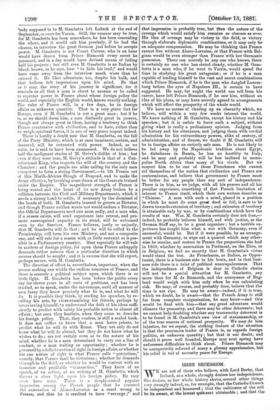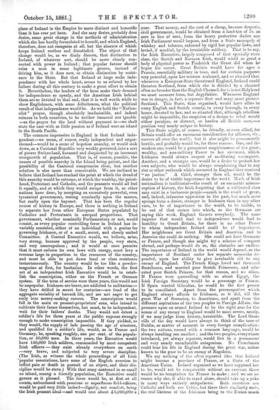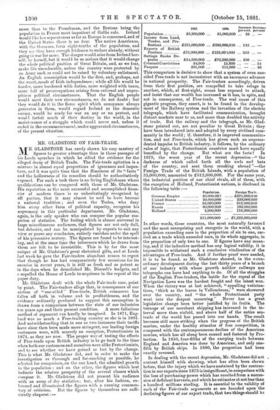IRISH SECESSION.
WE are not of those who believe, with Lord Derby, that Ireland, as a whole, strongly desires her independence: She desires, as her whole history shows, several other things very strongly indeed, as, for example, that the Catholic Church be independent and honoured ; that the cultivator of the soil be its owner, at the lowest quit-rent obtainable ; and that tto
place of Ireland in the Empire be more distinct and honorific than it has ever yet been. And she may desire, probably does desire, some great change in the methods of administration which she has hardly formulated to herself, and which England, therefore, does not recognise at all, hut the absence of which keeps Ireland restless and dissatisfied. The object of that change would be, as we dimly discern, that distinction in Ireland, of whatever sort, should be more closely con- nected with power in Ireland ; that popular favour should raise a man in some legitimate groove, instead of driving him, as it does now, to obtain distinction by resist- ance to the State. But that Ireland at large seeks inde- pendence with her whole heart, seems to us refuted by her failure during all this century to make a great effort to obtain it. Nevertheless, the leaders of the hour make their demand for independence so openly, and the American Irish behind, them are so devoted to that end, that it is well worth while to show Englishmen, with some definiteness, what the political result of that independence would be. As we hold the " Nation- alist " prayer, though absolutely inadmissible, and indeed ruinous to both countries, to be neither immoral nor ignoble —as the prayer for the land without payment is—we shall state the case with as little passion as if Ireland were an island in the South Pacific.
The common impression in England is that Ireland inde- pendent—we mean, of course, really independent and ungar- risoned—would be a scene of hopeless anarchy, or would sink down, as a Cantonal Republic very weakly governed, into a sort of poorer Switzerland, harassed and disquieted by an incessant overgrowth of population. That is, of course, possible, the causes of possible anarchy in the Island being patent, and the possibility of the Cantonal compromise clear, but another solution is also more than conceivable. We are inclined to believe that Ireland has reached the point at which the dread of this anarchy would be extreme, at which the wealthy, the priest- hood, Protestant and Catholic, and the peasants would all feel it equally, and at which they would escape from it, as other nations have done, by accepting an excessively powerful, even tyrannical government., resting nominally upon the masses, but really upon the bayonet. That has been the regular course of history in Europe, and there is nothing in Ireland to separate her from other European States populated by Catholics and Protestants in unequal proportions. That government, whether nominally Parliamentary or not, would consist, as every popular controlling force in Ireland has in- variably consisted, either of an individual with a genius for governing Irishmen, or of a small, secret, and closely united Committee. A Central Executive would, we believe, arise, very strong, because approved by the people, very stern, and very unscrupulous ; and it would at once perceive that it must enforce its own laws with energy, must levy a revenue large in proportion to the resources of the country, and must be able to put down local or class resistance instantaneously. The country would be too like a powder- magazine at first, for hesitation. In other words, the first act of an independent Irish Executive would be to estab- lish the conscription, either on the French or German system. If the term of service were three years, this would not be unpopular. Irishmen are brave, are addicted to militarism— they have drilled in secret for centuries—are fond of the aggregate sociality of barrack life, and are not eager to get early into money-making careers. The conscription would fall in the main on peasant-proprietors' sons, who intend to cultivate their farms themselves, but must, to be independent, wait for their fathers' deaths. They would not detest a soldier's life for three years at the public expense strongly enough to make conscription impossible. If they yielded, as they would, the supply of lads passing the age of nineteen, and qualified for a soldier's life, would, as in France and Germany, be, speaking roughly, one per .cent, of the popula- tion, or 50,000 men. In three years, the Executive would have 150,000 Irish soldiers, commanded by most competent Irish officers — they -exist already everywhere on . earth —very brave, and subjected to very severe discipline. (The Irish, as witness the whole proceedings of all Irish 'popular associations, have none of the English aversion to inflict pain or death in pursuit of an object, and their dis- cipline would be stern.) With that army cantoned in sa small an island, among a friendly population, the Executive .could govern as it pleased. The force would be, at _first at all events, unburdened with pensions or anperfLuous field-officers, would be paid every little indeed—dignity, not comfort, being the Irish peasant ideal—and would cost about 1:6,000,000 a year. That money, and the cost of a cheap, because despotic, civil government, would be obtained from a land-tax of 7s. an acre in lieu of rent, from the heavy protective duties any Irish Parliament would impose, and from a State monopoly of whiskey and tobacco, enforced by rigid but popular laws, and levied, if needful, by the irresistible soldiery. That is to say, the Irish Executive, largely composed of that specially stern class, the Scotch and Norman Irish, would wield as great a body of physical power as Frederick the Great did when he began his career. Great Britain would have for ages a Prussia, essentially military in tone, and for certain purposes very powerful, upon her western seaboard, and so situated that whenever a European State threatened England, Ireland could threaten Scotland, from which she is divided by a channel often no broader than the English Channel, for it is not Holyhead we must measure from, but Argyllshire. Whenever England was in danger, in fact, a separate fleet and army must protect Scotland. This State, thus organised, would have allies in every English and Scotch county, in every borough, in every house, devoted to her, and so situated that, although rebellion might be impossible, the suspicion of a design to rebel would either paralyse, or distract, or harden all British men,—a position very nearly unique in history.
This State might, of course, be friendly, or even allied, for Britain could offer an enormous consideration for alliance, viz, careers all over the world ; but it also might be permanently hostile, and probably would be, for three reasons. One, and the weakest one, would be a permanent suspiciousness of the great, wealthy, and non-military Power to her eastward, which Irishmen would always suspect of meditating reconquest. Another, and a stronger one, would be a desire to protect her own subjects, who would be always complaining that in any riot or other outbreak which occurred in England they received "no justice." A third, stronger than all, would be the desire to be of visible importance in the world. Much of Irish nationalism is traditional—the result of an excusable miscon- ception of history, the Irish forgetting that a cultivated class may exist in a barbarous people—much is the result of great, and, indeed, infamous oppression in the past, but much more springs from a desire, stronger in Irishmen than in any other race, to be of importance in the world, to be visible, to
be out of that corner into which, as the Germans are saying this week, England thrusts everybody. The same impulse that would lead to independence would lead to hostility to Great Britain, for there is no other Power to whom independent Ireland could bo ef importance. Her neighboms are Great Britain and America, and to America she could do nothing. She could not hurt Germany or France, and though she might try a scheme of conquest abroad, and perhaps would do so, the obstacles are endless. The importance of Ireland in the world would depend, as the importance of Scotland under her separate monarchs de- pended, upon her ability to give invaluable aid to any enemy of England. The French Kings loved and favoured Seotchmen, and married poor Scotch Princesses, and edu- cated poor Scotch Princes, for that reason, and no other. If France were quarrelling with us about Egypt, the Irish Foreign Secretary would be a personage in France. If Spain wanted Gibraltar, he would be the first person to be conciliated. Apart from the preoccupation which England always affords to Irishmen, as it did, till the great War of Secession, to Americans, and apart from the- different aspirations of the two peoples in Foreign Affairs, the pressure upon an armed Ireland to be the right arm for the nonce of any enemy to England would be most severe, nearly, if we may judge from history, irresistible. The Lord Gran- ville of the day would have always to think of the tone.of Dublin, as matter of moment in every foreign complication ; the two nations, cursed with a common language, would be always insulting one another ; and the two peoples, everywhere interlaced, yet always separate, would live in a permanent and very nearly unendurable antagonism. No Frenchman could bear his life in England during the great war, unless known to the poor to be an enemy of Napoleon.
We say nothing of the often repeated idea that Ireland might become a province of France, or a State of the American Union. Ireland organised as we have supposed her to be, would not be conquerable without an exertion there would be no temptation for France to make ; and we see no reason why she, if able to stand alone, should take up a yeke in many ways entirely antipathetic. Both coantrias .are Catholic and both are Celtic, but there their similarity end., the real likeness of the Irishman being to the Breton much
more than to the Frenchman, and the Bretons being the population in France most impatient of Gallic rule. Ireland would like her separateness as far as Europe is concerned, and of the United States there is no fear. The native Americans, with the Germans, form eight-tenths of the population, and they say they have enough Irishmen to endure already, without going to war for more. The danger would arise from Ireland her- self, by herself, but it would be so serious that it would change the whole political position of Great Britain, and, as we fear, make life unendurable, unless the country were protected by an Army such as could not be raised by voluntary enlistment. An English conscription would be the first, and, perhaps, not the worst, result of Irish independence ; while all life would be harder, more burdened with duties, more weighted with taxes, more full of preoccupations arising from external and unpro- pitious political circumstances. That the English people would meet their new circumstances, we do not doubt ; but they would do it in the fierce spirit Which annoyance always generates in them, would regard Ireland as the domestic enemy, would be ready for war on any or no pretext, and would forfeit much of their destiny in the world, in the maintenance of a struggle which could never end, unless it ended in the recommencement, under aggravated circumstances, of the present situation.




































 Previous page
Previous page